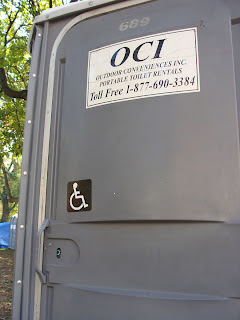99% Accessible
I've written before about how fascinated I am by the Occupy
movements in general and Occupy Toronto in particular and I'm about to go on
about it again. But this time, it's about a particular aspect of Occupy
Toronto.
A few weeks ago, I was wandering around the park checking things out when I saw this
A few weeks ago, I was wandering around the park checking things out when I saw this
An accessible porta potty. I stood (metaphorically) in front
of it for a little while, not because it reminded me of the state of my bladder, but because I was agog at what was happening. And then I wandered
further and saw this
And if they hadn't had my support before, as of that day, I
was firmly in their camp. Well, not literally - accessible porta potty
notwithstanding, camping is still not feasible for me.
A few days ago, I ran into one of the protesters, a woman named Emily who uses a scooter (she has a blog, but alas, I don't know where it is - Emily, if you read this, please send me the link). We chatted about the movement in general and it wasn't long before she told me that she was on Occupy Toronto's accessibility team. Yes, they have an accessibility team. I wasn't completely surprised because they had already proven to me that they were serious about including the disabled part of the 99%. Emily and I talked about accessibility, about our esteemed Mayor and his team not being excessively disability friendly either now or in their past (before Rob Ford became mayor, he demonstrated his sensitivity to this group). She told me that whenever she approached one of the many media teams that prowl the camp every day, hoping to discuss the accessibility aspect of the movement with them, they would turn off the cameras. And then she took me on a tour of one of their yurts, donated by OPSEU. I never knew that being inside a yurt was on my Life List, but it turns out it was. And the reason I could get inside was because they had built a ramp.
A few days ago, I ran into one of the protesters, a woman named Emily who uses a scooter (she has a blog, but alas, I don't know where it is - Emily, if you read this, please send me the link). We chatted about the movement in general and it wasn't long before she told me that she was on Occupy Toronto's accessibility team. Yes, they have an accessibility team. I wasn't completely surprised because they had already proven to me that they were serious about including the disabled part of the 99%. Emily and I talked about accessibility, about our esteemed Mayor and his team not being excessively disability friendly either now or in their past (before Rob Ford became mayor, he demonstrated his sensitivity to this group). She told me that whenever she approached one of the many media teams that prowl the camp every day, hoping to discuss the accessibility aspect of the movement with them, they would turn off the cameras. And then she took me on a tour of one of their yurts, donated by OPSEU. I never knew that being inside a yurt was on my Life List, but it turns out it was. And the reason I could get inside was because they had built a ramp.
Since that day, I've been thinking. Thinking about what is
says about our society that one of the best examples of an integrative efforts
is a bunch of people living in tents. People who have their own struggles, who
probably don't have much money, but who are determined to ensure equal
participation by all. And then I thought about how the majority of corporations
don't care about people with disabilities until a law says they must. About
politicians who drag their heels passing laws that protect and enable people
with disabilities. About Toronto's
hardship fund that helps seniors and people with disabilities get the kind of
equipment they need and can't afford and which is now on the chopping block in the upcoming budget. Because our esteemed Mayor is determined to cut everything
that makes our city great.
And speaking of Mayor Ford. Late last week in a scrum, he mentioned how it was time that the protesters move on. That he was representing the wishes of taxpayers, went on about how his office had been getting calls and when Rob Ford says that he’s been getting calls from taxpayers, it’s usually is a sign that he's about to do something rash and drastic. So I called his office to tell him that I was a taxpayer, too and I thought Occupy Toronto should be allowed to stay in the park. To which the minion I spoke to said that the mayor had no say in the matter, that it was completely up to the police. This despite Ford repeatedly saying he was "developing a plan" to deal with the issue.
Which brings me back to why I find this movement so fascinating. Because of how uncomfortable it makes a certain segment of society. It is as if by exercising the right to freedom of assembly - a right enshrined in various constitutions - and sticking around, they offer a challenge to a very deep belief about what one is supposed to do. So many people (politicians included) have said "they've made their point, now it's time to move on" and that statement in and of itself is proof that these people don't understand the point at all. But they want them to go away, to stop questioning the status quo, to stop challenging the power structure. They want them to go away so badly that they will jump on the slightest reason to move in and forcibly erase this challenge. There is much talk about drug and alcohol use in the camps and I suspect it is what will be used as an excuse to clear the park (even though the Anglican Church, co-owner of the park, supports the campers). Instead of fanning the flames, I wish clearer heads would prevail and realize that if you have a few incidents related to drugs and alcohol out of a camp of 500 people, then maybe the problem isn't all that different from the rest of society.
Here in Toronto, the movement is very clear that they are camping on church grounds and that this needs to be respected
And speaking of Mayor Ford. Late last week in a scrum, he mentioned how it was time that the protesters move on. That he was representing the wishes of taxpayers, went on about how his office had been getting calls and when Rob Ford says that he’s been getting calls from taxpayers, it’s usually is a sign that he's about to do something rash and drastic. So I called his office to tell him that I was a taxpayer, too and I thought Occupy Toronto should be allowed to stay in the park. To which the minion I spoke to said that the mayor had no say in the matter, that it was completely up to the police. This despite Ford repeatedly saying he was "developing a plan" to deal with the issue.
Which brings me back to why I find this movement so fascinating. Because of how uncomfortable it makes a certain segment of society. It is as if by exercising the right to freedom of assembly - a right enshrined in various constitutions - and sticking around, they offer a challenge to a very deep belief about what one is supposed to do. So many people (politicians included) have said "they've made their point, now it's time to move on" and that statement in and of itself is proof that these people don't understand the point at all. But they want them to go away, to stop questioning the status quo, to stop challenging the power structure. They want them to go away so badly that they will jump on the slightest reason to move in and forcibly erase this challenge. There is much talk about drug and alcohol use in the camps and I suspect it is what will be used as an excuse to clear the park (even though the Anglican Church, co-owner of the park, supports the campers). Instead of fanning the flames, I wish clearer heads would prevail and realize that if you have a few incidents related to drugs and alcohol out of a camp of 500 people, then maybe the problem isn't all that different from the rest of society.
Here in Toronto, the movement is very clear that they are camping on church grounds and that this needs to be respected
According to a few I've spoken to, they do their best to
deal with it, but they are facing some challenges. This park has always
been a haven for the homeless and I could imagine that having a camp
that provides regular meals is a bit of a draw for the disenfranchised and
needy. I've heard that recently, there was an overdose in the camp, but someone
found the person and they didn't die. I wonder if they hadn't taken the drugs there,
would they have overdosed and died in an alley, a rooming house or alone in
another park? But those overdoses don't make the headlines, do they?
Maybe we should all - and that includes our City Council - take the time to listen to the message instead of being so anxious to make it all go away.
And in the meantime, I'm going to go see the yurt one more time. Because I can. There’s a ramp.
Maybe we should all - and that includes our City Council - take the time to listen to the message instead of being so anxious to make it all go away.
And in the meantime, I'm going to go see the yurt one more time. Because I can. There’s a ramp.







Comments